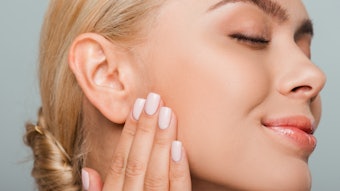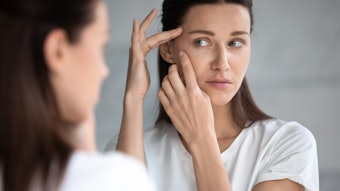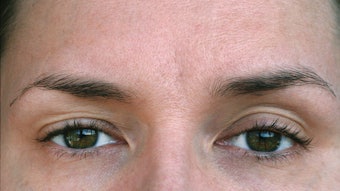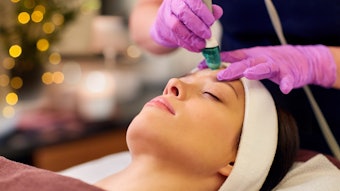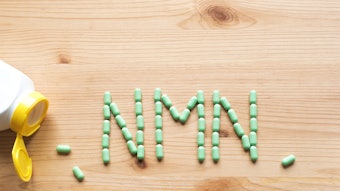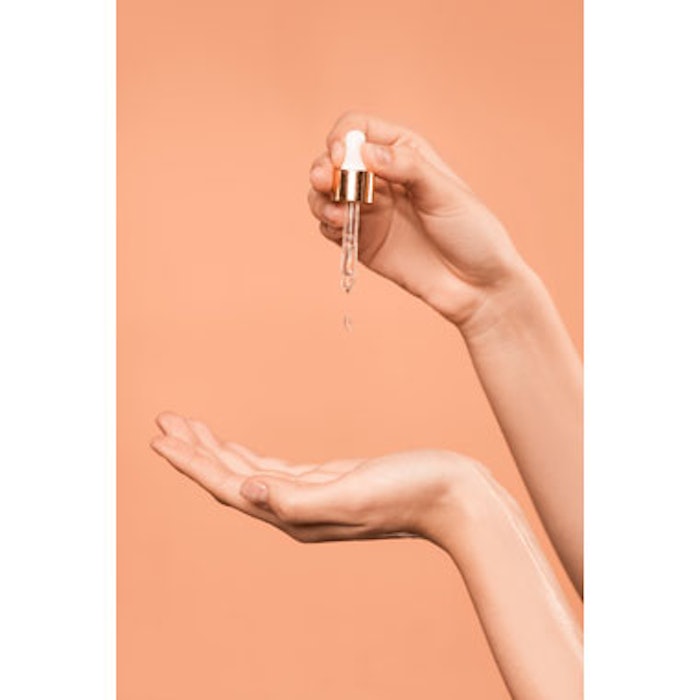
The skin can reveal a lot about a person—dark under-eye circles can suggest a sleepless night, while dull, dehydrated skin may point a finger toward a poor diet…or a bachelorette party weekend. The reason the skin has the power to tell someone’s life story is mainly attributed to the top layer of skin cells, also known as the skin barrier. It keeps the skin from losing too much water and keeps unhealthy external substances from penetrating the deeper layers of skin and causing inflammation and irritation. In basic terms, it keeps the good stuff in and the bad stuff out. Given the importance of the skin barrier in skin health and aging, it’s no wonder we’re hearing more and more about topical skincare ingredients that promise to protect and maintain barrier function.
Understanding the Skin Barrier
The skin barrier is the body’s first line of defense against impurities. It’s comprised of keratinocyte cells with a lipid mixture of cholesterol, fatty acids and ceramides that surround the cells. This forms a kind of brick-wall barrier. “Fifty years ago, scientists thought the skin barrier was just a protective layer of ‘dead’ skin cells,” says Menas Kizoulis, scientific engagement director of Johnson & Johnson Consumer. “Today, we know the skin barrier is a complex, dynamic structure that is very much alive and works in integrated ways to maintain skin health.”
When we’re young, the skin barrier is in peak condition (just like almost every other part of the body), but over time that barrier begins to break down. And when parts of a machine start to wear out, their job performance has a tendency to suffer. “As we age, the skin’s ability to maintain adequate hydration, normal activities and epidermal barrier function slows,” says Diane Nelson, vice president of medical, clinical and scientific affairs at Skinbetter Science. “Skin barrier quality weakens and water loss increases with higher levels of collagen degradation and loss of elasticity.” This results in the appearance of dehydrated skin, skin laxity and lines and wrinkles.
In addition most people will experience skin disease—whether poison ivy rash, nickel allergy, acne or psoriasis—at some point in their lives. These problems can reduce the skin barrier’s ability to do its job. These include everything from a. “Anything that causes inflammation and redness, in essence, breaks down your skin barrier,” says Tina S. Alster, MD, director of the Washington Institute of Dermatologic Laser Surgery. “That leads to loss of water [which] causes the skin to become dry.”
Atopic dermatitis/eczema can also reduce barrier function due in part to an elevated skin pH, which affects the skin’s ability to form a strong barrier, says Barbara Green, head of research and development at Neostrata.
Research has also shown that some individuals with atopic dermatitis have a mutation in the gene responsible for creating filaggrin—an important protein that helps maintain a strong skin barrier. “Without it the skin becomes ‘leaky,’—moisture escapes and skin becomes more susceptible to external insults,” says Nelson.
Ingredients That Protect
Patients who are experiencing aging-related changes to their skin as well as those battling skin diseases, such as acne or psoriasis, can benefit from topical ingredients that help maintain the integrity of the skin barrier.
Ceramides, natural moisturizing factors, essential fatty acids, hyaluronic acid and colloidal oatmeal are some of the top skin barrier-protecting ingredients that can be found on product labels. And each one has an integral role to play when it comes to keeping the barrier intact. Ceramides help reduce water loss, while essential fatty acids help hydrate and moisturize skin. Hyaluronic acid binds water, helping to hydrate skin, and colloidal oatmeal helps buffer skin’s pH level.
Other active ingredients, such as gluconolactone, go a step further and help strengthen the barrier against external aggressors by helping to build a stronger skin surface matrix. This type of polyhydroxy acid has been shown to help increase the skin’s resilience against external chemical insults with normal use, says Green. It also hydrates and conditions while smoothing the skin’s surface and brightening skin tone.
The Science Behind the Actives
Protecting and strengthening the skin barrier has become a key concern of skincare chemists and formulators, and they look to a growing body of research to identify effective and safe topical ingredients.
Nelson points to a May 2020 study by David H. McDaniel, MD, et al, published in the Journal of Cosmetic Dermatology that evaluated the expression of key biomarkers related to skin hydration and barrier support. The researchers compared key biomarkers of skin pretreated with a cream containing lipids, natural moisturizing factors and hyaluronic acid to untreated skin. The pretreated skin demonstrated increased expression of claudin-1, aquaporin and hyaluronic acid—all of which play an important role in skin hydration.
A 2020 clinical study published in the Journal of Drugs in Dermatology revealed that the use of a 1percent colloidal oat eczema cream significantly repairs skin barrier defects. In addition, a 2016 study published in the same journal revealed that colloidal oatmeal boosts the expression of multiple target genes related to the skin barrier. The researchers also noted recovery of barrier damage in an in vitro model of atopic dermatitis. The investigator-blinded study was performed with subjects who exhibited moderate to severe dry skin. The skin was treated with a colloidal oatmeal skin protectant lotion, which moisturized the skin and barrier. The study concluded that, “Taken together, these results demonstrate that colloidal oatmeal can provide clinically effective benefits for dry and compromised skin by strengthening [the] skin barrier.”
How Did We Get Here?
While there is a lot of recent data on the benefits of skin barrier-supporting ingredients, the idea of treating the barrier isn’t new. Industry professionals have known the importance of the skin barrier for decades, but consumers have only recently gotten hip to the idea of skin barrier protection. “It’s become front and center…because people tend to overprocess their skin,” says Dr. Alster. “It starts in the teenage years because people want to degrease their skin. They want to clean it, but they end up overprocessing it [by] using harsh toners, cleansers or scrubs that break down the skin barrier. They’re removing the oil, but they’re overdrying the skin and causing more inflammation.”
This overuse of products has been made possible by the breadth of available skincare options on the market, both online and on brick-and-mortar shelves, says Dr. Alster. Many of these over-the-counter products include harsh ingredients, such as alcohol, and high alkaline levels that disrupt the natural pH of the skin. To keep the skin barrier in good shape, Dr. Alster recommends that patients stay away from toners, which remove too much oil, and any product that contains fragrance. She’s not fond of pre-moistened facial wipes either, as they can cause irritation.
In addition to overuse of harsh skincare products by those who have oily or acne-prone skin, Dr. Alster points to social media and Internet culture as reasons why clients have a newfound interest in skin barrier care. Putting yourself on a public platform (with an easily accessible comment section) makes people naturally more concerned about the health and look of their skin. “People see their faces on the screen and they want to correct everything, even things that are imaginary or just blown up because of bad lighting,” she says. This has caused people who have normal skin to overuse harsh products, which leads to skin barrier problems.
Off-the-Face Barrier Repair
Given that the skin barrier plays such a fundamental role in keeping the skin healthy and beautiful, industry experts anticipate a rise in both usage and availability of skin barrier repair products in the years to come. “Products that support a healthy skin barrier are a foundational component to skin care—much like the use of retinoids, antioxidants and sunscreens,” says Nelson. “Savvy consumers will continue to seek products that ‘do more’ while eliminating potentially irritating ingredients.”
The current COVID-19 pandemic may also play a role in the usage of skin barrier products—but the emphasis will move from protecting the face to protecting the hands. The Centers for Disease Control and Prevention (CDC) has recommended frequent hand washing as a method to reduce the chances of spreading the virus, and frequent hand washing means incredibly dry hands.
“I hear complaints all the time now about people’s hands being too dry,” says Dr. Alster. She notes that the combination of frequent hand washing with the use of hand sanitizers with high alcohol content will create a need for products that can soothe the hands—especially since people seem to have an aversion to using moisturizers on a regular basis. “Most people, when they wash their hands, do not automatically put on a moisturizer afterwards…but they will need these products more and more.”
Dana Robinson is a freelance write based in Los Angeles.
Image Pexels/Shiny Diamonds
